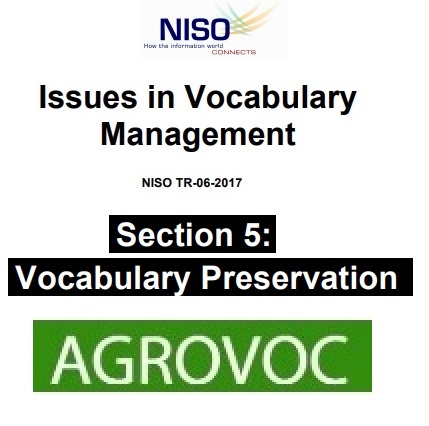NISO TR-06-2017: Issues in Vocabulary Management. AGROVOC thesaurus in "Vocabulary Preservation" Section


September 25, 2017 - The National Information Standards Organization (NISO) announces the publication of a new Technical Report, NISO TR-06-2017, Issues in Vocabulary Management.
This document is one outcome of the NISO Bibliographic Roadmap Development Project, which was conducted in 2013-14 with funding from the Andrew W. Mellon Foundation.
The report builds upon the work outlined in the 2014 project summary report Roadmap for the Future of Bibliographic Exchange by discussing policies supporting vocabulary use and reuse, documentation for vocabularies, and requirements for the preservation of RDF vocabularies.
AGROVOC multilingual thesaurus of the UN is highlighted within the Section 5 of the report entitled "Vocabulary Preservation".
The Audience for this technical reportstarts with Libraries, Publishers, and Service Providers. But beyond these communities, this document might be helpful to many individuals and groups building and sharing bibliographic and other descriptive data, as well as knowledge managers within a variety of organizations using vocabularies to solve problems. |
NISO TR-06-2017 "Issues in Vocabulary Management" is a result of ...
efforts by three working groups and a steering committee, whose remits illustrate the breadth of the work involved:
- The Use/Reuse working group looked at policy & social considerations, including appropriate licenses & permissions, maintenance expectations, and versioning;
- The Documentation working group explored standards for documentation of vocabulary properties, particularly as it relates to discovery & usage, as well as governance & sustainability issues;
- The Preservation working group examined the landscape issue of "orphan vocabularies," where organizations abandon vocabularies for lack of funding or when the vocabularies cannot make the transition between print and digital.
Section 5: "Vocabulary Preservation" highlights AGROVOC Multilingual thesaurus
"In the future, we can imagine a broadly distributed ecosystem for vocabulary creation, maintenance, and use based on a commonly agreed URI infrastructure, built to support distribution of terms to consumers based on their explicit preferences. The Food and Agriculture Organization (FAO) implements such a model for AGROVOC and it is instructive to review its features. The 32,000-concept agricultural vocabulary available in 27 languages is envisioned as a “quarry” where owners of local information systems can select relevant parts of the vocabulary and add their own concepts, depending on the needs of a specific country or domain The maintenance of AGROVOC is decentralized, based on the VocBench Web service for editing, publishing, and maintaining vocabularies. Partners from the AGROVOC community can add their own translations to existing AGROVOC concepts, and add new, specialized concepts that fit local needs not yet addressed by the concepts from the ‘official’ core vocabulary. FAO recognizes and welcomes many contributors to its community of collaborators. New terms can be suggested using the centralized Web service. These terms can be submitted for integration in the core vocabulary and approved by the relevant editors. But they can also be used in local applications by these who created and need them, as soon as they are created in VocBench. In a truly Linked Data approach, thanks to mappings to other vocabularies, AGROVOC can also be used as a hub from which to access many other vocabularies available on the Web. AGROVOC is a large and well-supported effort, with a robust community that illustrates how flexibility and good management can build stability over time". |
Comments about the report: *** "NISO is grateful to the many volunteer experts whose work contributed to this much-needed technical report," comments NISO Executive Director Todd Carpenter. "In the past, vocabularies were tied to particular collections and tended to become insular, but today we need descriptive information that works in the Linked Open Data environment. Enabling interoperability among systems and organizations is a major goal of NISO's work, and this technical report moves us forward in that area." |
About NISO
NISO, based in Baltimore, Maryland, fosters the development and maintenance of standards that facilitate the creation, persistent management, and effective interchange of information so that it can be trusted for use in research and learning. To fulfill this mission, NISO engages libraries, publishers, information aggregators, and other organizations that support learning, research, and scholarship through the creation, organization, management, and curation of knowledge. NISO works with intersecting communities of interest and across the entire lifecycle of information standards. NISO is a not-for-profit association accredited by the American National Standards Institute (ANSI). For more information, visit the NISO website.
Related content:
- Daniel Lovins, Diane Hillmann, Broken-World Vocabularies, D-Lib Magazine, March/April 2017, Volume 23, Number 3/4
- Olga Lavrenova, Vasily Pavlov, The Publication of a Knowledge Organization Classification System as a Linked Data Vocabulary, in NKOS 2017 Proceedings, 17th European Networked Knowledge Organization Systems (NKOS) Workshop
- Armando Stellato, Andrea Turbati, Manuel Fiorelli, Tiziano Lorenzetti, Eugeniu Costetchi, Christine Laaboudi, Willem Van Gemert, Johannes Keizer,Towards VocBench 3: Pushing Collaborative Development of Thesauri and Ontologies Further Beyond, in NKOS 2017 Proceedings, 17th European Networked Knowledge Organization Systems (NKOS) Workshop
- Assigning METADATA as method to support DIGITAL DATA CURATION in trusted repositories (on AIMS)
- Recorded Webinar@AIMS : Metadata as Standard: improving Interoperability through the Research Data Alliance (on AIMS)
- How to select appropriate encoding strategies for producing Linked Open Data (LOD)-enabled bibliographic data (on AIMS)
- The role of AGROVOC and other LOD vocabularies in architectural models of interoperability (on AIMS)
- LIVIVO: search portal for medicine, health, nutrition, environmental and agricultural sciences (on AIMS)

